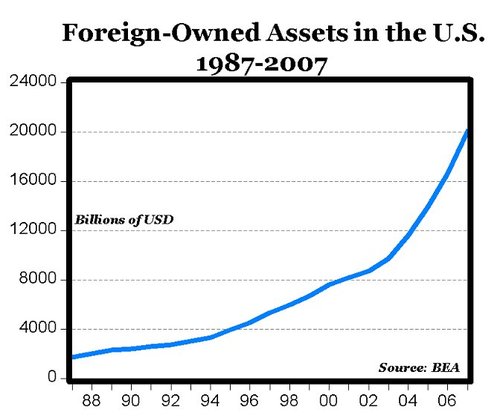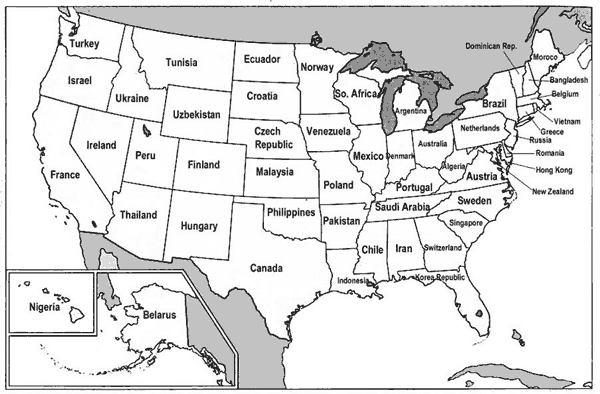I've gotten mail and comments on some of my surveillance- and detention-related posts, particularly this one here, that boil down to "but warrant-less national security eavesdropping is legal". John Hinderaker at Powerline makes this argument fairly compellingly. To which I can answer, fine, but whether it is narrowly legal or illegal is a topic for partisan blogs who want to score points for or against Bush. As one of those weird libertarian guys, my intention was to stand aside from the question of legality and instead pose the question of "yes, but is it right?"
Foreigners are People Too
It is interesting that I have to make this point more and more nowadays: Foreignors are human beings too. For example, this idea that non-US citizens have (or should have) the same rights we do was one I highlighted in my defense of open immigration:
The individual rights we hold dear are our rights as human beings, NOT
as citizens. They flow from our very existence, not from our
government. As human beings, we have the right to assemble with
whomever we want and to speak our minds. We have the right to live
free of force or physical coercion from other men. We have the right
to make mutually beneficial arrangements with other men, arrangements
that might involve exchanging goods, purchasing shelter, or paying
another man an agreed upon rate for his work. We have these rights and
more in nature, and have therefore chosen to form governments not to be
the source of these rights (for they already existed in advance of
governments) but to provide protection of these rights against other
men who might try to violate these rights through force or fraud
Speech, commerce, property, association, and yes, privacy -- these are all rights we have as human beings, so that the fact of citizenship in the US should not have any bearing on whether our government should respect these rights (except in the case of war, which we get into in a while).
These issues are oh-so-much clearer when we flip our perspective. For Americans reading this, ask yourself:
- Does the government of Great Britain (or Russia, or Iran) have the right to wiretap your phone calls at will without warrant or review just because you are not a citizen of their country?
- Does the government of Great Britain (or Russia, or Iran) have the right to detain you indefinitely without access to a lawyer or embassy if a powerful person in their government declares you an enemy combatant?
If you answered "yes", then recognize that the 1979 capture of the US embassy staff in Iran was probably legal by your rules, as was nearly every other detention of American citizens by another country. If you answered "no", then you need to be worried about what the US is doing in the name of national security, for certainly both Bush and Clinton, among others, claim(ed) these rights. And if you answered "no" for all other countries but "yes" for us, presumably because you trust our guys but not theirs, I will admit you have some historical precedent, since the US for all its faults has generally acted more honorably than 99% of the other nations of the world over the last 100 years. But you do need to think about the meaning of the rule of law, and why its always a bad idea to give good men power that you don't want bad men to have.
By saying this, I realize that am I not only out of step with the US appellate courts (as Hinderaker points out) and with the Supreme Court (at least on the detention issue, since they haven't ruled on the warrant-less search powers) but also perhaps with the founding fathers. While most of the folks who wrote the Constitution understood the notion of rights that are derived from nature rather than from the state, the Constitution is mute on the laws of the US vis a vis foreign citizens (excepts where it comes to war). It is interesting to note that the Bill of Rights doesn't make any distinctions between citizens and non-citizens - there is nothing, for example, that modifies the prescriptions of the fourth amendment to apply only to searches of US citizens. One could easily interpret the Bill of Rights as proscribing the actions of the US government against any person of any nationality. Anyway, if I am in conflict with the founding fathers, so be it -- the Constitution is a fabulous document as totally ahead of its time as would be having 19th century India put a man on the moon, but it was not perfect.
The Magic Words: National Security
You may notice that defenders of these presidential powers tend to play a little verbal slight of hand (in addition to the one discussed here): They translate the president's powers as CinC to mean "carte blanch for national security issues". You hear this slight-of-hand so often, one starts to think its written that way in the Constitution, so it is probably good to remind ourselves what that document actually says:
The President shall be commander in chief of the Army and Navy of the
United States, and of the militia of the several states, when called
into the actual service of the United States
That's it. The president can give orders to the military -- whether that means he can do anything he wants in the name of national security is a whole other issue. Folks also seem to want to argue that this CinC power cannot be modified or limited in any way, but that's silly. The third amendment is aimed solely at the limiting the power of the military. And certainly the folks who first adopted the constitution and the Bill of Rights believed that the 4th amendment applied to the military as well. In fact, they would have said especially the military.
The Right Way to do Searches
Here is how we have generally interpreted the 4th amendment: The legislative branch sets the ground rules, as followed by the Administration. The administrations selection of targets is reviewed by the Judiciary (warrants) and is also subject to later review at trial (via the admissibility of evidence). What we try to avoid is allowing the same person to set the rules, choose the target, and perform the surveillance, all in secret and without outside review. The problems with the NSA wiretapping program is not that it is wrong per se, but that it may violate this process. The administration is claiming the right to choose the target and perform the surveillance under the own rules and in secret with no possibility of review.
Declaration of War Needs to Mean Something Again
If there is any part of the constitution that has really gone by the wayside in the last 50 years it is the provisions around declaration of war. Over the past decades, president's have claimed the power to move forces into action, not just defensively but offensively, without a Congressional declaration of war. And Hinderaker sees the declaration of war, or the Authorization to Use Military Force
(AUMF) as irrelevant to the legality of warrant-less national security
searches. He is arguing that the President in his CinC power may search without warrant if it is substantially to fight an enemy. And, absent an AUMF or a declaration of war, who decides if a group or nation or person is an enemy? why, the President does. And, who determines if a surveillance is necessary to fight this enemy? Why, yes, the President does as well. And who reviews these decisions to make sure the President hasn't chosen to search or wiretap, under the pretext of national security, communists in Hollywood, Martin Luther King, or a self-generated "enemies list" -- no one, I mean, no Administration official in this country would ever do those things, would they?
I have increasingly come to the belief that the AUMF, or declaration of war, is supposed to mean something. (I am not a Constitutional scholar, and don't want to hear about how I don't understand such and such precedent* -- this is my own interpretation). If one goes back to my first argument above, that all people, not just citizens, are constitutionally protected from our government searching or detaining them without warrant, then the declaration of war is that formal step that is necessary to free the CinC from these restrictions vis a vis a certain named and defined enemy. The declaration of war, or AUMF, is effectively then the mass warrant, that gives the president the right in his role as CinC to attack those folks with our troops and detain them and spy on them, etc. And even then, this is not without limit, since none of us are very happy with the Japanese detention precedent in WWII. This view of the declaration of war is more consistent with the original notion of separation of powers than is the "administration can do anything to protect national security" view. It allows the President pretty free reign to fight an enemy, including the types of tactics under dispute, but only after the body the founders considered the most sober had approved the war and the enemy (by sober I mean as envisioned by the founding fathers, and not as demonstrated in recent supreme court nomination hearings).
This obviously makes a declaration of war a BIG DEAL, which it should be, rather than just a set piece vote ratifying what the president seems hellbent to do anyway or a statement of moral support, along the lines of a "we support the troops" resolution. It means that the Congress, god forbid, actually needs to treat the vote with some responsibility and understand the implications of what they are voting for, or else modify the AUMF or articles of war with specific limitations of scope. And it means Congress needs to think twice and maybe three times before authorizing war against something as nebulous as "A Qaeda" or "terrorism". And it means that GWB probably is doing nothing illegal, at least in the programs as discovered, but it doesn't mean that the courts or Congress can't change that in the future.
* Constitutional scholars live and die by the great god "precedent", and certainly the legal system would be thrown into disarray if court decisions did not provide precedents for later decisions. All predictability in the system would vanish. However, it is more than OK from time to time to go back to the original words of the Constitution to see if the march of serial precedent has somehow taken us off course. I often liken this to a copier machine. If you take a plain piece of paper, and copy it, and then copy the copy, and then copy that copy, etc. through twenty or thirty generations, you will end up with a paper that is supposed to be a copy of the original, but in fact is covered with spots and other artifacts that were not on the original. A series of court precedents can also create such artifacts that can only really be identified not from looking at the last precedent it was built on, but going all the way back to the original Constitution.


